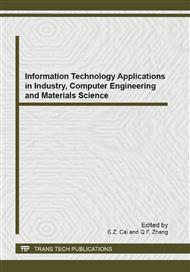p.3084
p.3089
p.3094
p.3099
p.3103
p.3109
p.3114
p.3121
p.3125
A Tag-Based Search Algorithm for Causal Bayesian Networks
Abstract:
In this study, in order to improve the search efficiency of causal Bayesian network structure learning, a new tag-based search algorithm is developed. The algorithm uses tags and the topology structure of tags to mark different types of variables, thus narrowing the search space of causal Bayesian network structure learning. With this algorithm, the task of combining causal Bayesian network theory with existing theories or models in certain application establishments when causal analysis is required becomes simpler. The time complexity of the tag-based search algorithm, compared with other search algorithms, has been reduced. Moreover, the experimental results show that the efficiency and accuracy of the tag-based search algorithm are both high.
Info:
Periodical:
Pages:
3103-3108
Citation:
Online since:
September 2013
Authors:
Price:
Сopyright:
© 2013 Trans Tech Publications Ltd. All Rights Reserved
Share:
Citation:


